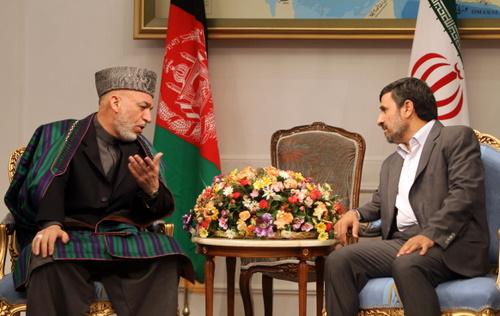India’s deal with Afghanistan could boost Iran’s role, too
Iranian President Mahmoud Ahmadinejad met with Afghanistan’s Hamid Karzai in Tehran on March 26, 2011, before his visit to New Delhi this week. India’s connections with Afghanistan and Iran may offer Kabul an alternative to becoming a vassal state of Pakistan.
The U.S. efforts to isolate Iran with economic sanctions may backfire in post-war Afghanistan, as Tehran could well emerge as a key counterbalance to an increasingly reckless and hostile Islamabad.
Already resisting U.S. pressure as far as Iran is concerned, India is apparently angling to leverage its continued engagement with Tehran to gain a much-needed foothold in Afghanistan as the cracks deepen in the U.S.-Pakistan alliance and open a wider range of possibilities for post-war Kabul.
Apart from a deal that will see Indian soldiers training Afghan troops — much to Islamabad's chagrin — Afghan President Hamid Karzai and Indian Prime Minister Manmohan Singh on Tuesday inked an economic agreement that will involve Indian investment in Afghanistan's mineral wealth and also may open up trade routes for Afghanistan through Iran, India's Hindu newspaper reported.
"This means both countries will try to operationalise their trilateral MoU signed with Iran to end Afghanistan's landlocked isolation and dependence on Pakistan to reach the sea," the paper said. "It brightens India's chances of bagging a lucrative mining contract for Hajigak, said to be the region's largest untapped reserve of iron ore, and provides an opportunity to hunt for oil in northern Afghanistan."
Despite a convergence of interests after 9/11 that saw both Iran and the U.S. supporting the Northern Alliance in the fight against the Taliban, Washington has remained suspicious of Tehran's agenda in Afghanistan — opting to stake everything on Islamabad.
We want to hear your feedback so we can keep improving our website, theworld.org. Please fill out this quick survey and let us know your thoughts (your answers will be anonymous). Thanks for your time!
